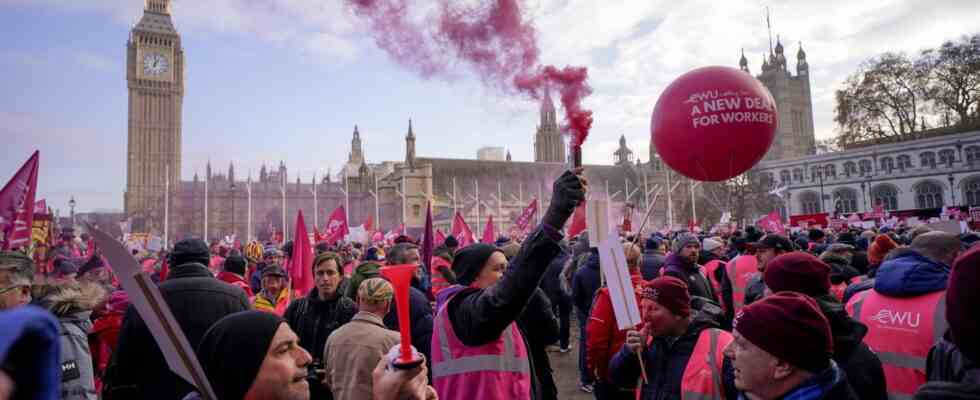Status: 12/13/2022 2:29 p.m
A wave of strikes is imminent in Great Britain: In many sectors, employees want to go on strike in order to fight for better wages. But the economic situation is unlikely to leave much room for manoeuvre.
It is the biggest strike to hit the UK in years. 40,000 employees from various railway companies are down from work today and three other days this week. It is said that those who do not have to travel should stay at home. The responsible transport minister warned that many families would have to experience a digital Christmas because they could not travel to their relatives.
“No sympathy for workers’ struggle”
Mick Lynch, head of the RMT union, provided the accompanying music in an interview with the BBC. The audibly upset Lynch accused the presenter on the station radio 4 before not reporting neutrally. “They show no sympathy for workers’ struggles to restore balance to our society. They never criticize the super-rich and what they do to nurses or postal workers.” These are the tones in a country that is facing a comprehensive winter of strikes.
The employer Network Rail had submitted an offer: wage increases of five percent this year and four percent next year. But the largest trade union, RMT, rejected the offer. Lynch argues that inflation is significantly higher. This year, the inflation rate rose to 11.1 percent in October. In addition, the trade unions are opposed to what they believe to be a significant deterioration in night and weekend shifts. Royal Mail workers will also go on strike in the next few days. Also border guards, ambulance drivers and nurses from the NHS health service.
Healthcare industry at the limit
The economic situation for many healthcare workers is currently difficult. Lizzy is currently training to be a nurse. She is a sophomore at Bristol. The money just isn’t enough, she said BBC. She can’t afford to go out. “Instead, we scrape together the pennies for the weekly grocery shopping. I also have to pay for gas. It’s particularly difficult in winter when we can’t heat half the time.”
As a trained nurse, young professionals earn around 30,000 euros per year – gross. The unions are now demanding significant increases of over 19 percent. Many in the industry have the impression that savings have been made for years, that working conditions are getting worse and worse: understaffed shifts, underfunded emergency rooms, horror stories about hours of waiting in the emergency rooms, patients lying on the floor in the corridors, the shortage reigns. Health Secretary Steven Barclay argued that inflation compensation for all government employees would cost over 30 billion euros. The most important goal must be to reduce inflation. It becomes clear: the government has been saving on health care for years, now the deficits in the NHS are becoming visible in several places.
Gloomy economic prospects
The government is acting cautiously in these wage disputes. The finance minister has just presented a budget to calm the financial markets. The government has also launched expensive aid to mitigate high energy prices. The prospects for the economy are poor: the British economy is slipping into recession, and tax revenue is likely to fall. Extensive wage increases can hardly be financed without tax increases, which the conservative government wants to avoid at all costs.

